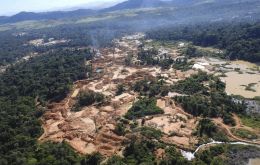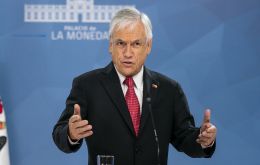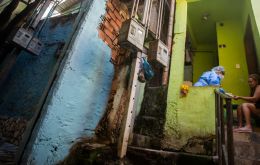MercoPress. South Atlantic News Agency
Stories for 2021
-
Tuesday, August 31st 2021 - 09:09 UTC
Research shows illegal mining in Brazil on the rise

A scientific report released Monday by the organization MapBiomas showed that 65% of mining activities carried out in the Brazilian Amazon basin were not legal.
-
Tuesday, August 31st 2021 - 09:08 UTC
Brazil confident soybeans harvest will confirm it continues as the world's leader in the oilseed production

Brazil's National Supply Company, Conab, anticipated forecasts for the coming grains and oilseeds season 2021/22. The soy crop is expected to reach some 141,26 million tons or a 3.9% increase over the current harvest.
-
Tuesday, August 31st 2021 - 09:05 UTC
China limits video gaming (“spiritual opium”) by teenagers to three hours a week

China has implemented strict regulations regarding video gaming by minors below 18, which will be limited to three hours a week to combat what authorities have described as the “spiritual opium”.
-
Tuesday, August 31st 2021 - 08:58 UTC
Piñera's “Ten Pillars” to save water in drought stricken Chile

Chile presented on Monday a “Plan to combat Drought” to increase the provision of water and improve its efficient use thus ensuring the supply for human consumption and the production of food.
-
Tuesday, August 31st 2021 - 08:56 UTC
Chile announces sanitary protocol for tourists on cruise expeditions to Antarctica

Chile announced on Monday that foreign tourists on cruise expeditions to Antarctica can call and land in the country as long as they comply with a strict sanitary protocol. Andrea Wolleter, head of Chile's tourism services made the announcement following on reiterated petitions from organizations linked to the tourism industry as well as regional and city officials.
-
Tuesday, August 31st 2021 - 08:53 UTC
Argentina, Cuba ratify willingness to strengthen bilateral ties

Argentina's International Economic Relations Secretary Jorge Neme held a meeting Monday in Havanna with Cuba's Foreign Minister Bruno Rodríguez, during which both countries ratified their intention to strengthen bilateral ties.
-
Monday, August 30th 2021 - 09:48 UTC
New limits dispute arises between Chile and Argentina

A new controversy regarding boundaries between Chile and Argentina has erupted following the issuance of charts allegedly violation of a 1984 treaty.
-
Monday, August 30th 2021 - 09:38 UTC
Chile and Argentina agree to discuss ongoing continental shelf differences south of Cape Horn

Chile and Argentina have resurfaced an ongoing dispute over the extent of the continental shelf in the extreme south of the South American continent, but hopefully, both sides have agreed to sit and discuss the issue bilaterally, peacefully and abstaining from any statement and/or action that can hamper the process of a harmonious dialogue.
-
Monday, August 30th 2021 - 09:30 UTC
Governor reelected in Argentine province of Corrientes heralds further defeats for President Fernández's party

Incumbent Governor Gustavo Valdés of the Radical Civil Union (UCR) was reelected Sunday for a new four-year term in office at the helm of the Argentine province of Corrientes.
-
Monday, August 30th 2021 - 09:17 UTC
Pandemic, unemployment and inflation increasing Brazilian families debts

The percentage of Brazilian indebted families reached 72,9% in August, considered a new record and a direct consequence of the economic hardships because of the pandemic, unemployment and inflation, according to a release from the National Confederation of Retail, Services and Tourism, CNC.
